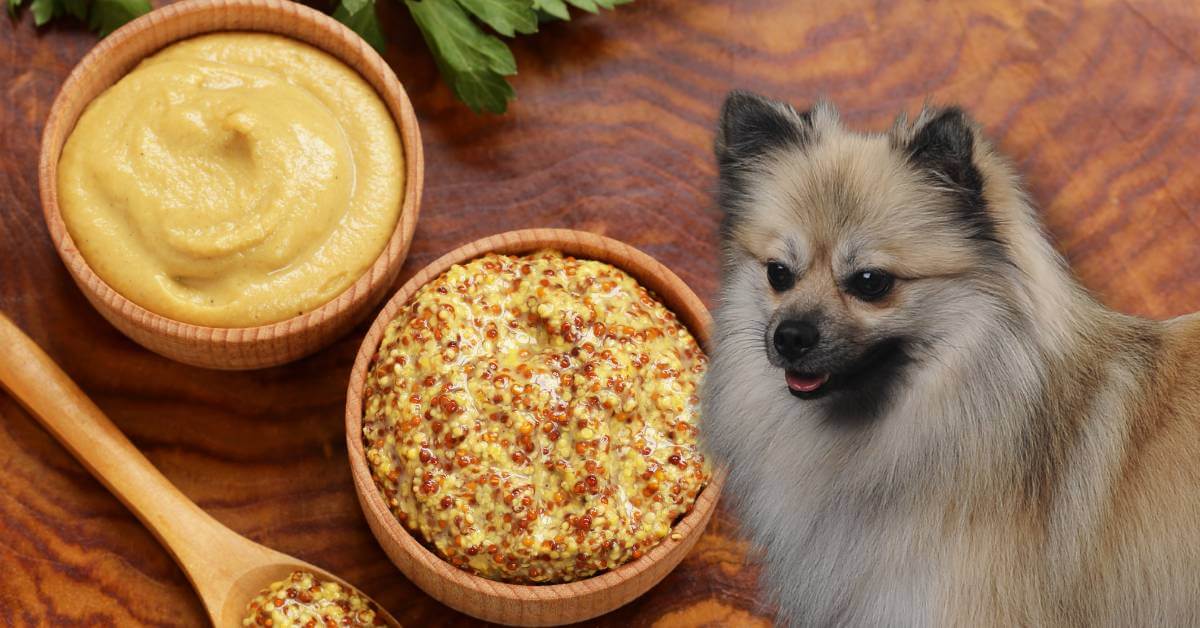Can Dogs Eat Mustard?
No, your dog shouldn’t eat mustard. Contrary to popular belief, mustard is not toxic to dogs, but it’s an irritant. And while it’s true that mustard seeds contain toxic components, processed supermarket mustard, no matter the amount, won’t be immediately harmful to your dog.
Please don’t panic if your dog eats some mustard—they will most likely be fine. However, it’s good to know that you should generally avoid mustard and other condiments with salt and vinegar.

When we share our food with dogs, we need to be extra careful because their digestive systems work differently. Lots of human foods can upset their stomachs or cause other problems.
Take supermarket mustard, for example—it often has extra stuff like vinegar, salt, and spices that aren’t great for dogs. If you’re having hot dogs with mustard and your dog sneaks a bite, they might accidentally get too much mustard (and hot dogs are also not ideal for dogs). So, it’s a good idea to keep mustard and other similar condiments away from them to avoid any issues.
Why is mustard bad for dogs?
Mustard is bad for dogs mainly because of the ingredients that can irritate dog’s stomach and the mustard seeds, which are toxic to dogs. These seeds contain glucosinolates, which turn into isothiocyanates—compounds that can upset your dog’s stomach, leading to issues like stomach pain, diarrhea, and vomiting.
While a small amount of mustard might cause mild discomfort, your dog won’t experience mustard seed toxicity if they eat mustard! It has to be a significant amount of pure mustard seeds, and even then, toxicity may not occur.
Another useful thing to know is that mustard also has goitrogens, which can interfere with thyroid function, but this typically requires a large amount. So, while a tiny bit might not be a disaster, it’s best to keep mustard out of your dog’s reach to avoid any potential issues.
Different types of mustard, ingredients, and why they’re not safe for dogs
Along with the toxic mustard seeds, mustard contains other ingredients that can irritate your dog’s stomach.
What to do if your dog eats too much mustard?
Thankfully, mustard isn’t toxic to dogs. If your dog happens to eat too much mustard, you might see some gastrointestinal upset like lack of appetite, vomiting, or diarrhea. These symptoms are usually short-lived and should resolve on their own without needing any special treatment.
There’s no need to induce vomiting or seek treatment unless the symptoms are severe or persistent. Just keep an eye on your dog and make sure they stay hydrated.
However, if your dog eats a whole jar of mustard, it might be a good idea to offer them more food to help dilute the mustard they ingested. You can give them plain foods like pumpkin puree, lactose-free milk, or chicken broth. These can help soothe their stomach and flush out the mustard. Just be sure to monitor them for any signs of discomfort and keep them hydrated. If you’re worried or if their symptoms don’t improve, it’s always best to consult your vet.
Love, life, and fur forever!
FAQs
Can dogs eat honey mustard?
No, dogs shouldn’t eat honey mustard. While honey itself isn’t harmful in small amounts, mustard can irritate your dog’s stomach. Plus, the added sugar and other ingredients like vinegar can upset their stomach. It’s best to keep honey mustard away from your dog.
Can dogs eat Dijon mustard?
Dijon mustard is a no-go for dogs. It’s made with mustard seeds, which contain compounds that can irritate your dog’s digestive system. On top of that, Dijon mustard often includes wine or vinegar, which can be harsh on their stomach. So, it’s best to avoid giving your dog any Dijon mustard.
Can dogs eat yellow mustard?
Yellow mustard might seem harmless, but it’s still not safe for dogs. The mustard seeds in it can cause stomach issues, and the added salt and vinegar aren’t great for them, either. If your dog sneaks a lick, don’t panic, but try to keep yellow mustard out of their reach in the future.
Can dogs eat mustard and ketchup?
Mustard and ketchup are both best avoided when it comes to your dog’s diet. Mustard contains toxic seeds, and ketchup often has ingredients like sugar, salt, and sometimes even onions or garlic, which aren’t safe for dogs. If you’re having a BBQ, it’s best to keep these condiments away from your dog’s plate.